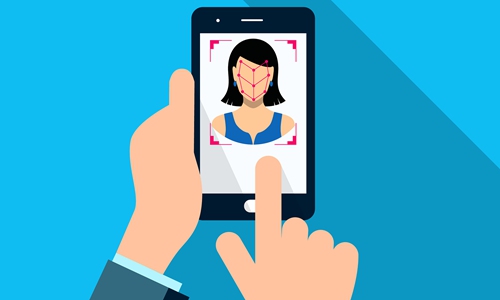HOME >> OPINION
Using facial recognition tech protects human rights
By Li Qingqing Source:Global Times Published: 2019/12/3 22:28:43

Photo: VCG
Chinese mobile phone users have been required to submit their facial recognition scans to verify their identity when applying for new phone numbers, according to the Ministry of Industry and Information Technology. The new rule took effect on Sunday, and triggered much attention from the international community. Many Western media accused the rule of violating human rights, and some even said that China has taken another step toward a "dystopian surveillance state."What is the most important human right? It might be security. Facial recognition and the real-name system are currently the most effective ways to crack down on telecommunications fraud and identity theft. These measures have successfully protected the personal and property security of Chinese mobile phone users.
China has become one of the countries with the fastest development of facial recognition, but some Western media have been using the cliché of human rights to attack China. They have not realized that the convenience and security brought by the new technology are also a guarantee of human rights.
For example, some people have blackened China's use of surveillance products including facial recognition and big data analysis in Northwest China's Xinjiang Uyghur Autonomous Region, saying they violate the human rights of the people in the region. However, these products are meant to detect terrorists and protect ordinary people, and facial recognition has played an important role in countering terrorism and bringing peace back to Xinjiang. Isn't this a great explanation of human rights?
In fact, China is not the only country that uses facial recognition and surveillance cameras. These have been adopted by many countries to maintain social security and stability. In October, France reportedly used facial recognition to give its citizens digital identities. As early as 2011, there had already been a network of almost 2 million surveillance cameras in the UK, according to The Guardian's report. But why do some Western media hype only China's use of facial recognition and surveillance cameras? The Western double standards are way too obvious.
We need to admit that facial recognition has faced some technological controversies. For example, some argue that facial recognition will leak personal information and affect the security of people's biological information. It is true that any identification technology should regard users' rights as a priority.
However, China has been constantly regulating the use of facial recognition.
In November, China set up a national-level working group to set standards for the country's first facial recognition regulation. The group consists of 27 prominent Chinese companies, including Tencent and iFlytek, and aims to promote China's governance in artificial intelligence and boost the sound development of the industry.
The development of new technology is unstoppable. Instead of accusing China of putting so-called electronic anklets on Chinese people, Western media should see that China has been exploring the boundaries of the rules of new technology. Such exploration can also be a reference for other countries. Some Western countries should not ignore or even blacken China's efforts.
Posted in: OBSERVER